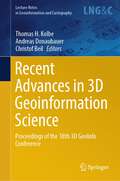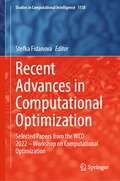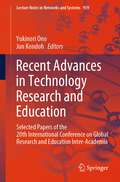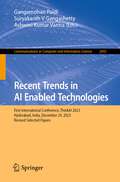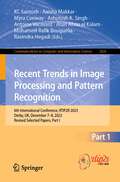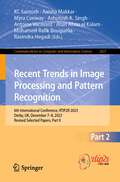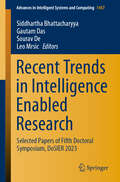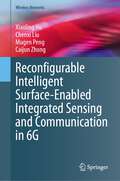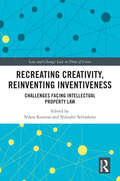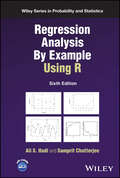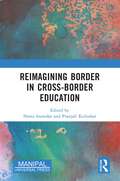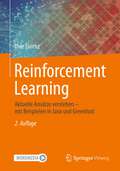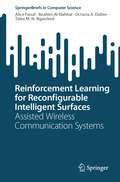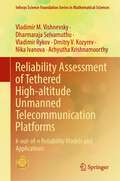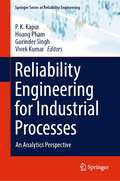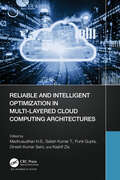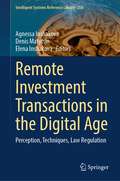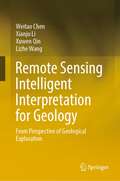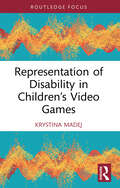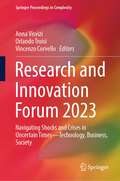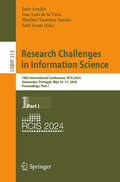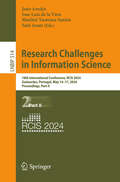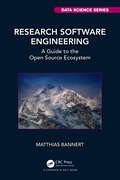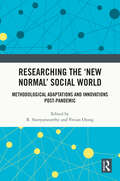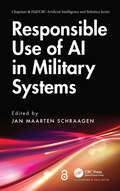- Table View
- List View
Recent Advances in 3D Geoinformation Science: Proceedings of the 18th 3D GeoInfo Conference (Lecture Notes in Geoinformation and Cartography)
by Thomas H. Kolbe Andreas Donaubauer Christof BeilThe book includes the contributions to the international conference “18th 3D GeoInfo”. The papers published in the book were selected through a double-blind review process. 3D GeoInfo has been the forum joining researchers, professionals, software developers, and data providers designing and developing innovative concepts, tools, and application related to 3D geo data processing, modeling, management, analytics, and simulation. A big focus is on topics related to data modeling for 3D city and landscape models as well as their many and diverse applications. This conference series is very successfully running since 2006 and has been hosted by countries in Europe, Asia, Africa, North America, and Australia. In the period 2006 to 2017, the proceedings has been published by Springer in this series with Thomas H. Kolbe being the editor of the 2010 edition of the conference proceedings. 18th 3DGeoInfo was organized by Technical University of Munich in cooperation with the German Society for Photogrammetry, Remote Sensing and Geoinformation (DGPF), the local associations Runder Tisch GIS e.V. (Round Table GIS) and Leonhard Obermeyer Center—TUM Center of Digital Methods for the Built Environment, and the City of Munich. The international program committee consisted of committee members of previous 3D GeoInfo conferences and further leading scientists in the field of 3D Geoinformation Science.
Recent Advances in Computational Optimization: Selected Papers from the WCO 2022 – Workshop on Computational Optimization (Studies in Computational Intelligence #1158)
by Stefka FidanovaThe book is a comprehensive collection of extended contributions from the Workshops on Computational Optimization 2022. Our everyday life is unthinkable without optimization. We try to minimize our effort and to maximize the achieved profit. Many real world and industrial problems arising in engineering, economics, medicine, and other domains can be formulated as optimization tasks. This book presents recent advances in computational optimization. The book includes important real problems like modeling of physical processes, parameter settings for controlling different processes, agricultural modeling transportation problems, energy management, machine scheduling, air pollution modeling, optimization of fast-food restaurant chain, and solving engineering and financial problems. It shows how to develop algorithms for them based on new intelligent methods like evolutionary computations, ant colony optimization, constrain programming Monte Carlo method, and others. This book demonstrates how some real-world problems arising in engineering, economics, and other domains can be formulated as optimization problems.
Recent Advances in Technology Research and Education: Selected Papers of the 20th International Conference on Global Research and Education Inter-Academia (Lecture Notes in Networks and Systems #939)
by Yukinori Ono Jun KondohThis book presents the 20th edition of the Inter-Academia Conference which aims to be a valuable resource for academic institutions in search for novel approaches for a global education, for industry partners exploring new fundamental research ideas, for government bodies seeking international projects that promote sustainable growth, and most certainly for the global scientific community, more and more invested in the multi-disciplinarity of modern research. Interdisciplinary research collaboration is crucial for solving many pressing issues and challenges facing society today. Bringing together researchers and educators from different disciplines allows a more holistic understanding of complex problems, providing also the opportunity for new learning and for collaboration on complex projects. Beyond its scientific merits and value, Inter-Academia also promotes a culture of intellectual diversity, innovative thinking, and global perspective that can foster breakthrough discoveries, unexpected advancements in research, and, last but not least, a sense of belonging to a global community. Being established in 2002, the Inter-Academia Community currently gathers researchers from 14 leading Universities in Eastern and Central Europe, together with Shizuoka University, in Japan. As such, the Inter-Academia Community serves as a strong bond across continents, allowing the development of a number of global projects for student and researcher mobility, with a significant impact on the broader scientific community. The peer-reviewed papers included in this book hopefully stimulate further interactions and collaborations covering both fundamental and applied research, with benefits for the global society.
Recent Trends in AI Enabled Technologies: First International Conference, ThinkAI 2023, Hyderabad, India, December 29, 2023, Revised Selected Papers (Communications in Computer and Information Science #2045)
by Gangamohan Paidi Suryakanth V Gangashetty Ashwini Kumar VarmaThis book constitutes the refereed proceedings of the First International Conference on Recent Trends in AI Enabled Technologies, ThinkAI 2023, which took place in Hyderabad, India, in December 2023. The 7 full papers presented in these proceedings were carefully reviewed and selected from 51 submissions. The conference focuses on on up to date topics and recent trends in artificial intelligence and related technologies.
Recent Trends in Image Processing and Pattern Recognition: 6th International Conference, RTIP2R 2023, Derby, UK, December 7–8, 2023, Revised Selected Papers, Part I (Communications in Computer and Information Science #2026)
by Kc Santosh Aaisha Makkar Myra Conway Ashutosh K. Singh Antoine Vacavant Anas Abou el Kalam Mohamed-Rafik Bouguelia Ravindra HegadiThis book constitutes the refereed proceedings of the 6th International Conference on Recent Trends in Image Processing and Pattern Recognition, RTIP2R 2023, held in Derby, UK, during December 2023, in collaboration with the Applied AI Research Lab at the University of South Dakota.The 62 full papers included in this book were carefully reviewed and selected from 216 submissions. The papers are organized in the following topical sections:Volume I:Artificial intelligence and applied machine learning; applied image processing and pattern recognition; and biometrics and applications.Volume II:Healthcare informatics; pattern recognition in blockchain, IOT, cyber plus network security, and cryptography.
Recent Trends in Image Processing and Pattern Recognition: 6th International Conference, RTIP2R 2023, Derby, UK, December 7–8, 2023, Revised Selected Papers, Part II (Communications in Computer and Information Science #2027)
by Kc Santosh Aaisha Makkar Myra Conway Ashutosh K. Singh Antoine Vacavant Anas Abou el Kalam Mohamed-Rafik Bouguelia Ravindra HegadiThis book constitutes the refereed proceedings of the 6th International Conference on Recent Trends in Image Processing and Pattern Recognition, RTIP2R 2023, held in Derby, UK, during December 2023, in collaboration with the Applied AI Research Lab at the University of South Dakota.The 62 full papers included in this book were carefully reviewed and selected from 216 submissions. The papers are organized in the following topical sections:Volume I:Artificial intelligence and applied machine learning; applied image processing and pattern recognition; and biometrics and applications.Volume II:Healthcare informatics; pattern recognition in blockchain, IOT, cyber plus network security, and cryptography.
Recent Trends in Intelligence Enabled Research: Selected Papers of Fifth Doctoral Symposium, DoSIER 2023 (Advances in Intelligent Systems and Computing #1457)
by Siddhartha Bhattacharyya Gautam Das Sourav De Leo MrsicThis book gathers extended versions of papers presented at DoSIER 2023 (Fifth Doctoral Symposium on Intelligence Enabled Research, held at Cooch Behar Government Engineering College, West Bengal, India, during December 20–21, 2023). The papers address the rapidly expanding research area of computational intelligence, which, no longer limited to specific computational fields, has since made inroads in signal processing, smart manufacturing, predictive control, robot navigation, smart cities, and sensor design, to name but a few. Presenting chapters written by experts active in these areas, the book offers a valuable reference guide for researchers and industrial practitioners alike and inspires future studies.
Reconfigurable Intelligent Surface-Enabled Integrated Sensing and Communication in 6G (Wireless Networks)
by Xiaoling Hu Chenxi Liu Mugen Peng Caijun ZhongAs the main trend and key enabling technology for next-generation wireless networks (i.e., 6G), integrated sensing and communication (ISAC) can effectively improve spectrum efficiency, hardware efficiency, and information processing efficiency. However, it faces several deficiencies, including limited coverage due to high-frequency signals and limited communication-sensing performance due to uncontrollable wireless environments. Reconfigurable intelligent surface (RIS) provides novel dimensions to address these deficiencies by intelligently manipulating the wireless propagation environment in an energy- and hardware-efficient manner. RIS-enabled ISAC is expected to comprehensively promote the multi-dimensional performance of 6G, such as communication capacity, sensing accuracy, and coverage. Nevertheless, to fully realize its potential, one needs to figure out the impacts of RIS on joint communication and sensing performance and tackle new technical challenges in beamforming design and signal processing. The goal of this book, therefore, is to deliver a thorough understanding of RIS-enabled ISAC from three perspectives: performance analysis, beamforming design, and signal processing. Specifically, the authors provide a brief introduction to RIS-enabled ISAC, including basic concepts, motivations, potential application scenarios, and an overview of the state-of-the-art research on RIS-enabled ISAC. The theoretical performance analytical frameworks of RIS-enabled ISAC and their corresponding results are also discussed. Based on this, several critical issues are identified and elaborated on, including signal processing technologies such as angle and Delay-Doppler information acquisition, and air interface technologies such as beamforming designs. Finally, the book concludes with future trends and open issues for further research.The book would be beneficial for researchers, graduate students, and industry professionals who wish to gain a comprehensive understanding of the latest developments and challenges in RIS-enabled ISAC. By providing insights into the potential of RIS-enabled ISAC and the technical challenges that need to be addressed, the book can aid in the development of practical solutions for next-generation wireless networks and contribute to the advancement of the field of wireless communications.
Recreating Creativity, Reinventing Inventiveness: AI and Intellectual Property Law (Law and Change)
by Nikos Koutras and Niloufer SelvaduraiAs artificial intelligence (AI) is increasingly used to generate inventions and creative works, a critical question to be addressed is whether intellectual property (IP) laws should protect such works. This book examines the critical question of whether intellectual property laws should protect works generated by artificial intelligence.If we do not wish to use IP laws to protect such works, how can we still support research, development, and innovation in society? If we do wish to use IP laws to protect such works, should the copyright, patents, and other IP rights attach to the human creator of the AI technology or the AI system? The book explores these compelling societal, economic, and legal issues. The authors evaluate the continuing relevance of existing laws, explore the divergent approaches being debated by nations around the world, and present visions for change.The book will enable both lawyers and non-lawyers to reimagine governance frameworks to create laws that equitably balance the interests of creators, investors, and end users of AI-generated works.
Regression Analysis By Example Using R (Wiley Series in Probability and Statistics)
by Ali S. Hadi Samprit ChatterjeeRegression Analysis By Example Using R A STRAIGHTFORWARD AND CONCISE DISCUSSION OF THE ESSENTIALS OF REGRESSION ANALYSIS In the newly revised sixth edition of Regression Analysis By Example Using R, distinguished statistician Dr Ali S. Hadi delivers an expanded and thoroughly updated discussion of exploratory data analysis using regression analysis in R. The book provides in-depth treatments of regression diagnostics, transformation, multicollinearity, logistic regression, and robust regression. The author clearly demonstrates effective methods of regression analysis with examples that contain the types of data irregularities commonly encountered in the real world. This newest edition also offers a brand-new, easy to read chapter on the freely available statistical software package R. Readers will also find: Reorganized, expanded, and upgraded exercises at the end of each chapter with an emphasis on data analysis Updated data sets and examples throughout the book Complimentary access to a companion website that provides data sets in xlsx, csv, and txt format Perfect for upper-level undergraduate or beginning graduate students in statistics, mathematics, biostatistics, and computer science programs, Regression Analysis By Example Using R will also benefit readers who need a reference for quick updates on regression methods and applications.
Reimagining Border in Cross-border Education
by Neeta Inamdar Pranjali KirloskarUniversities are inherently and definitionally universal in their quest for the creation and dissemination of knowledge. They are set to defy borders that exist in parochial forms. Globalization which opened up borders has by design or default created inequalities and imbalances in knowledge systems. Undoubtedly, knowledge is power but there is difference in the power that is intrinsic to it and the power that is ascribed which is determined by dominant political and economic hierarchies. If knowledge predominantly flows from global north to global south, people seeking knowledge move from global south to global north. These imbalances are also seen within these regions, between cultures and communities, one claiming superiority over the other. These realities call for a reassessment of not only what constitutes knowledge, but also what encompasses the idea of borders. This book elaborates on the inclusive role of education that can act as an equalizer or as a catalyst for creating a level playing field across borders. Print edition not for sale in South Asia (India, Sri Lanka, Nepal, Bangladesh, Pakistan and Bhutan)
Reinforcement Learning: Aktuelle Ansätze verstehen – mit Beispielen in Java und Greenfoot
by Uwe LorenzIn uralten Spielen wie Schach oder Go können sich die brillantesten Spieler verbessern, indem sie die von einer Maschine produzierten Strategien studieren. Robotische Systeme üben ihre Bewegungen selbst. In Arcade Games erreichen lernfähige Agenten innerhalb weniger Stunden übermenschliches Niveau. Wie funktionieren diese spektakulären Algorithmen des bestärkenden Lernens? Mit gut verständlichen Erklärungen und übersichtlichen Beispielen in Java und Greenfoot können Sie sich die Prinzipien des bestärkenden Lernens aneignen und in eigenen intelligenten Agenten anwenden. Greenfoot (M.Kölling, King’s College London) und das Hamster-Modell (D.Bohles, Universität Oldenburg) sind einfache, aber auch mächtige didaktische Werkzeuge, die entwickelt wurden, um Grundkonzepte der Programmierung zu vermitteln. Wir werden Figuren wie den Java-Hamster zu lernfähigen Agenten machen, die eigenständig ihre Umgebung erkunden. Die zweite Auflage enthält neue Themen wie "Genetische Algorithmen" und "Künstliche Neugier" sowie Korrekturen und Überarbeitungen.
Reinforcement Learning for Reconfigurable Intelligent Surfaces: Assisted Wireless Communication Systems (SpringerBriefs in Computer Science)
by Alice Faisal Ibrahim Al-Nahhal Octavia A. Dobre Telex M. NgatchedThis book presents the intersection of two dynamic fields: Reinforcement Learning (RL) and RIS- Assisted Wireless Communications. With an emphasis on both discrete and continuous problems, it introduces a comprehensive overview of RL techniques and their applications in the evolving world of RIS-assisted wireless communications. Chapter 1 introduces the fundamentals of RL and deep RL (DRL), providing a solid foundation for understanding subsequent chapters. It also presents the Q-learning, deep Q-learning, and deep deterministic policy gradient algorithms. Chapter 2 provides a holistic overview of RIS-assisted systems and details several use cases in wireless communications. Then, Chapters 3 and 4 present various applications of the discrete and continuous DRL to RIS-assisted wireless communications. From maximizing the sum-rate to minimizing, the system resources and maximizing the energy efficiency. These chapters showcase the versatility of the DRL algorithms in tackling arange of challenges. This book concludes with Chapter 5, which introduces the challenges and future directions in this field. It explores the particulars of hyperparameter tuning, problem design, and complexity analysis, while also highlighting the potential of hybrid DRL, multi-agent DRL, and transfer learning techniques for advancing wireless communication systems. Optimizing RIS-Assisted Wireless Systems requires powerful algorithms to cope with the dynamic propagation environment. DRL is envisioned as one of the key enabling techniques to exploit the full potential of RIS-Assisted Wireless Communication Systems. It empowers these systems to intelligently adapt to dynamic wireless environments, maximize performance metrics, and adjusts their configurations to accommodate diverse use cases efficiently. This book serves as a valuable resource, shedding light on the potential of DRL to optimize RIS-Assisted Wireless Communication, enabling researchers, engineers, advanced level students in computer science and electrical engineering and enthusiasts to grasp the intricacies of this topic. It offers a comprehensive understanding of the principles, applications, and challenges, making it a reference to recognize the full potential of the RIS technology in modern wireless communication systems.
Reliability Assessment of Tethered High-altitude Unmanned Telecommunication Platforms: k-out-of-n Reliability Models and Applications (Infosys Science Foundation Series)
by Vladimir M. Vishnevsky Dharmaraja Selvamuthu Vladimir Rykov Dmitry V. Kozyrev Nika Ivanova Achyutha KrishnamoorthyThis book provides a systematic presentation of the major results in the field of the theory of k-out-of-n systems obtained in recent years and their applications for the reliability assessment of high-altitude unmanned platforms. Mathematical models, methods, and algorithms, presented in the book, will make a significant contribution to the development of reliability theory and the theoretical foundations of unmanned UAV-based aerial communications networks in the framework of the concept of creating the 5G and beyond networks. The book gives a description of new mathematical methods and approaches (based on decomposable semi-regenerative processes, simulation and machine learning methods, and inventory models) to the study of the complex k-out-of-n systems, which makes it possible to carry out numerical calculations of reliability indicators. Organized into five chapters, each chapter begins with a summary of the main definitions andresults contained in the chapter. The content of this book is based on the original results developed by the authors, many of which appear for the first time in book form.
Reliability Engineering for Industrial Processes: An Analytics Perspective (Springer Series in Reliability Engineering)
by P. K. Kapur Hoang Pham Gurinder Singh Vivek KumarThis book explores how transformative changes driven by the new-age economy can bring about improvements in a company's engineering and manufacturing capabilities. The new-age economy is driven by advanced engineering and manufacturing practices, processes, and technologies, including the Internet of Things (IoT), Cloud Computing, Blockchain, Artificial Intelligence, Robotics, Cyber-Physical Systems (CPS), and Internet-enabled systems to automate industrial processes. Today's business dynamics are governed by uncertainties, disruptions, complexities, and ambiguities that demand quicker and more intelligent decisions. These changes could relate a renaissance in the company's engineering and manufacturing capabilities. To sustain these volatile and ever-changing business dynamics, Industry 4.0 and 5.0 have revolutionized how organizations operate and make intelligent business decisions. Moreover, the extensive role of business analytics has overcome the limitations ofclassical computing through new technologies and intelligent computing methodologies. Over the past few years, much emphasis has been given to investing in developing hardware and programming frameworks for achieving computational intelligence using fuzzy logic, evolutionary computation, neural networks, probabilistic methods, and learning theory. Within this frame of reference, the reliability, quality, and maintenance of complex industrial and manufacturing systems are essential for organizations to utilize them successfully for informed decisions. This book focuses on studies that provide new solutions for system reliability, quality, security, and maintainability using quantitative and qualitative research. It emphasizes developments and problems in systems engineering management, systems integration, software and hardware engineering, and the development process.
Reliable and Intelligent Optimization in Multi-Layered Cloud Computing Architectures
by Madhusudhan H. S. Satish Kumar T. Punit Gupta Dinesh Kumar Saini Kashif ZiaOne of the major developments in the computing field has been cloud computing, which enables users to do complicated computations that local devices are unable to handle. The computing power and flexibility that have made the cloud so popular do not come without challenges. It is particularly challenging to decide which resources to use, even when they have the same configuration but different levels of performance because of the variable structure of the available resources. Cloud data centers can host millions of virtual machines, and where to locate these machines in the cloud is a difficult problem. Additionally, fulfilling optimization needs is a complex problem.Reliable and Intelligent Optimization in Multi-Layered Cloud Computing Architectures examines ways to meet these challenges. It discusses virtual machine placement techniques and task scheduling techniques that optimize resource utilization and minimize energy consumption of cloud data centers. Placement techniques presented can provide an optimal solution to the optimization problem using multiple objectives. The book focuses on basic design principles and analysis of virtual machine placement techniques and task allocation techniques. It also looks at virtual machine placement techniques that can improve quality-of-service (QoS) in service-oriented architecture (SOA) computing. The aims of virtual machine placement include minimizing energy usage, network traffic, economical cost, maximizing performance, and maximizing resource utilization. Other highlights of the book include: Improving QoS and resource efficiency Fault-tolerant and reliable resource optimization models A reactive fault tolerance method using checkpointing restart Cost and network-aware metaheuristics. Virtual machine scheduling and placement Electricity consumption in cloud data centers Written by leading experts and researchers, this book provides insights and techniques to those dedicated to improving cloud computing and its services.
Remote Investment Transactions in the Digital Age: Perception, Techniques, Law Regulation (Intelligent Systems Reference Library #250)
by Agnessa Inshakova Denis Matytsin Elena InshakovaThe book contains the results of the best research developments obtained during the implementation of major scientific events organized and carried out with the financial support of the Russian Science Foundation and the President of the Russian Federation.The scientific novelty of the work lies in the fact that for the first time at the level of Russian and international interdisciplinary social and humanitarian sciences, primarily economic and legal, firstly, philosophical concepts and regulatory legal approaches to the regulation of remote investment transactions have been studied; secondly, a set of economic and legal conditions and means of harmonizing and observing the mutual interests of participants in remote investment transactions has been developed and proposed in order to prevent and minimize potential conflicts between the parties; thirdly, the current state and international regulation of investment transactions concluded and executed on Internet platforms was critically assessed; fourthly, a system of guarantees and protection of the rights of participants in remote investment transactions is proposed, including special contractual structures and an economic and legal model for the proper fulfillment of obligations.Measures are substantiated to expand and increase the intensity of the national investment turnover based on the improvement of the current legislation regulating investments through remote digital technologies in the Internet space, which provided a solution to the world scientific problem of great socioeconomic and economic importance. The book is designed for a wide target audience—scientists of different generations, different disciplinary and industry affiliations. Among them are young researchers, as well as scientists who have received recognition from the world scientific community, studying the socioeconomic, managerial, and legal consequences of the emergence and spread of digital technologies in the field of investment. Readers can be all individuals and legal entities interested in the development of digital technologies in the field of investment.
Remote Sensing Intelligent Interpretation for Geology: From Perspective of Geological Exploration
by Weitao Chen Xianju Li Xuwen Qin Lizhe WangThis book presents the theories and methods for geology intelligent interpretation based on deep learning and remote sensing technologies. The main research subjects of this book include lithology and mineral abundance. This book focuses on the following five aspects: 1. Construction of geology remote sensing datasets from multi-level (pixel-level, scene-level, semantic segmentation-level, prior knowledge-assisted, transfer learning dataset), which are the basis of geology interpretation based on deep learning. 2. Research on lithology scene classification based on deep learning, prior knowledge, and remote sensing. 3. Research on lithology semantic segmentation based on deep learning and remote sensing. 4. Research on lithology classification based on transfer learning and remote sensing. 5. Research on inversion of mineral abundance based on the sparse unmixing theory and hyperspectral remote sensing. The book is intended for undergraduate and graduate students who are interested in geology, remote sensing, and artificial intelligence. It is also used as a reference book for scientific and technological personnel of geological exploration.
Representation of Disability in Children’s Video Games (Routledge Research in Disability and Media Studies)
by Krystina MadejRepresentation of Disability in Children’s Video Games looks at how children’s engagement with characters and stories in video games helps create the perception of disability they have as teens and adults. Drawing on child development theory supported by neuroscience, the book shows how the scaffold of information, the schema, adults have of disability is first created at a very young age as they interact through game play with characters with disabilities. Positing that early video game play experiences should provide exposure to narrative schemas that add understanding and help create meaning about the disability represented, the book presents how such representation in children’s video games maps against cognitive development, and the psychomotor and cognitive needs and abilities of children ages 3 to 12. Close reading of over 40 PEGI 3 and PEGI 7 (ESRB E, 10+) games and analysis of games as diverse as Backyard Baseball and Sly Cooper helped define broad categories of representation: representation can be cosmetic, providing exposure but not gameplay utility; it can be incidental, used as a device that provides purpose for the narrative; or it can more authentically represent the disability as integral to the character and their life. The book provides readers with an overview of contemporary games that betters their understanding of how children’s games present disability and how children create their perceptions through interaction with characters and stories. This book will be of interest to academics and students of game studies, in particular topics such as behavioural science, ethics, and HCI, as well as sociology, communications, and digital media.
Research and Innovation Forum 2023: Navigating Shocks and Crises in Uncertain Times—Technology, Business, Society (Springer Proceedings in Complexity)
by Anna Visvizi Orlando Troisi Vincenzo CorvelloThis book features research presented and discussed during the Research & Innovation Forum (Rii Forum) 2023. As such, this book offers a unique insight into emerging topics, issues and developments pertinent to the fields of technology, innovation and education and their social impact. Papers included in this book apply inter- and multi-disciplinary approaches to query such issues as technology-enhanced teaching and learning, smart cities, information systems, cognitive computing and social networking. What brings these threads of the discussion together is the question of how advances in computer science—which are otherwise largely incomprehensible to researchers from other fields—can be effectively translated and capitalized on so as to make them beneficial for society as a whole. In this context, Rii Forum and Rii Forum proceedings offer an essential venue where diverse stakeholders, including academics, the think tank sector and decision-makers, can engage in a meaningful dialogue with a view to improving the applicability of advances in computer science.
Research Challenges in Information Science: 18th International Conference, RCIS 2024, Guimarães, Portugal, May 14–17, 2024, Proceedings, Part I (Lecture Notes in Business Information Processing #513)
by João Araújo Jose Luis de la Vara Maribel Yasmina Santos Saïd AssarThis book constitutes the proceedings of the 18th International Conference on Research Challenges in Information Sciences, RCIS 2024, which took place in Guimarães, Portugal, during May 2024. The scope of RCIS is summarized by the thematic areas of information systems and their engineering; user-oriented approaches; data and information management; business process management; domain-specific information systems engineering; data science; information infrastructures, and reflective research and practice. The 25 full papers, 12 Forum and 5 Doctoral Consortium papers included in these proceedings were carefully reviewed and selected from 100 submissions. They were organized in topical sections as follows: Part I: Data and information management; conceptual modelling and ontologies; requirements and architecture; business process management; data and process science; security; sustainability; evaluation and experience studies Part II: Forum papers; doctoral consortium papers.
Research Challenges in Information Science: 18th International Conference, RCIS 2024, Guimarães, Portugal, May 14–17, 2024, Proceedings, Part II (Lecture Notes in Business Information Processing #514)
by João Araújo Jose Luis de la Vara Maribel Yasmina Santos Saïd AssarThis book constitutes the proceedings of the 18th International Conference on Research Challenges in Information Sciences, RCIS 2024, which took place in Guimarães, Portugal, during May 2024. The scope of RCIS is summarized by the thematic areas of information systems and their engineering; user-oriented approaches; data and information management; business process management; domain-specific information systems engineering; data science; information infrastructures, and reflective research and practice. The 25 full papers, 12 Forum and 5 Doctoral Consortium papers included in these proceedings were carefully reviewed and selected from 100 submissions. They were organized in topical sections as follows: Part I: Data and information management; conceptual modelling and ontologies; requirements and architecture; business process management; data and process science; security; sustainability; evaluation and experience studies Part II: Forum papers; doctoral consortium papers.
Research Software Engineering: A Guide to the Open Source Ecosystem (Chapman & Hall/CRC Data Science Series)
by Matthias BannertResearch Software Engineering: A Guide to the Open Source Ecosystem strives to give a big-picture overview and an understanding of the opportunities of programming as an approach to analytics and statistics. The book argues that a solid "programming" skill level is not only well within reach for many but also worth pursuing for researchers and business analysts. The ability to write a program leverages field-specific expertise and fosters interdisciplinary collaboration as source code continues to become an important communication channel. Given the pace of the development in data science, many senior researchers and mentors, alongside non-computer science curricula lack a basic software engineering component. This book fills the gap by providing a dedicated programming-with-data resource to both academic scholars and practitioners.Key Features overview: breakdown of complex data science software stacks into core components applied: source code of figures, tables and examples available and reproducible solely with license cost-free, open source software reader guidance: different entry points and rich references to deepen the understanding of selected aspects
Researching the ‘New Normal’ Social World: Methodological Adaptations and Innovations Post-Pandemic
by R. Sooryamoorthy Vivian OjongThis edited volume focuses on the changing research methodologies in social science research, prompted by the new social world shaped by the pandemic. It explores adaptations and developments to meet the demands of transforming social circumstances and showcases innovative alternative approaches. Featuring a range of international and interdisciplinary contributors who discuss the context of social science research in the "new normal", the book sets out the need to redesign research to address present-day challenges for the post-pandemic. Chapters share methodological innovations and demonstrate how applicable these new and adapted methodologies are to a world post-pandemic, discussing a wide range of innovative, digital-first research methods with practical analysis. The role of technology and its application in social science research during this transition is explored in particular, alongside new approaches to quantitative and qualitative research that feature innovations in ethnography, online data collection, and ethical protocols for research. Ultimately offering a comprehensive exploration of adaptive and innovative social science research methodologies suited to the current social context, the book will be relevant to researchers, academics, and scholars in the fields of research methods, research technologies, and the sociology of education.
Responsible Use of AI in Military Systems (Chapman & Hall/CRC Artificial Intelligence and Robotics Series)
by Jan Maarten SchraagenArtificial Intelligence (AI) is widely used in society today. The (mis)use of biased data sets in machine learning applications is well‑known, resulting in discrimination and exclusion of citizens. Another example is the use of non‑transparent algorithms that can’t explain themselves to users, resulting in the AI not being trusted and therefore not being used when it might be beneficial to use it.Responsible Use of AI in Military Systems lays out what is required to develop and use AI in military systems in a responsible manner. Current developments in the emerging field of Responsible AI as applied to military systems in general (not merely weapons systems) are discussed. The book takes a broad and transdisciplinary scope by including contributions from the fields of philosophy, law, human factors, AI, systems engineering, and policy development.Divided into five sections, Section I covers various practical models and approaches to implementing military AI responsibly; Section II focuses on liability and accountability of individuals and states; Section III deals with human control in human‑AI military teams; Section IV addresses policy aspects such as multilateral security negotiations; and Section V focuses on ‘autonomy’ and ‘meaningful human control’ in weapons systems.Key Features: Takes a broad transdisciplinary approach to responsible AI Examines military systems in the broad sense of the word Focuses on the practical development and use of responsible AI Presents a coherent set of chapters, as all authors spent two days discussing each other’s work This book provides the reader with a broad overview of all relevant aspects involved with the responsible development, deployment and use of AI in military systems. It stresses both the advantages of AI as well as the potential downsides of including AI in military systems.
